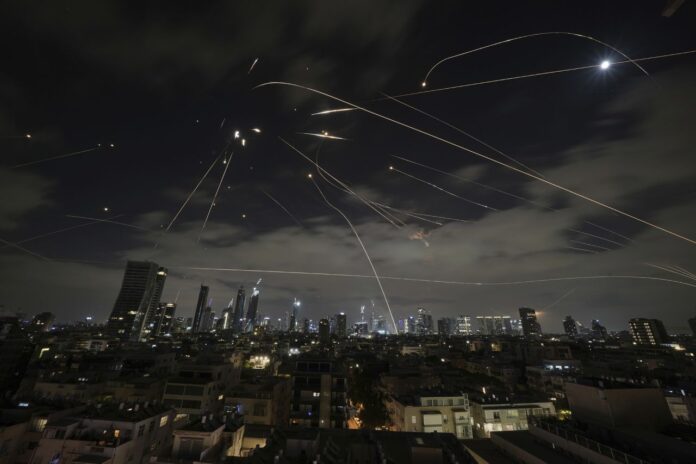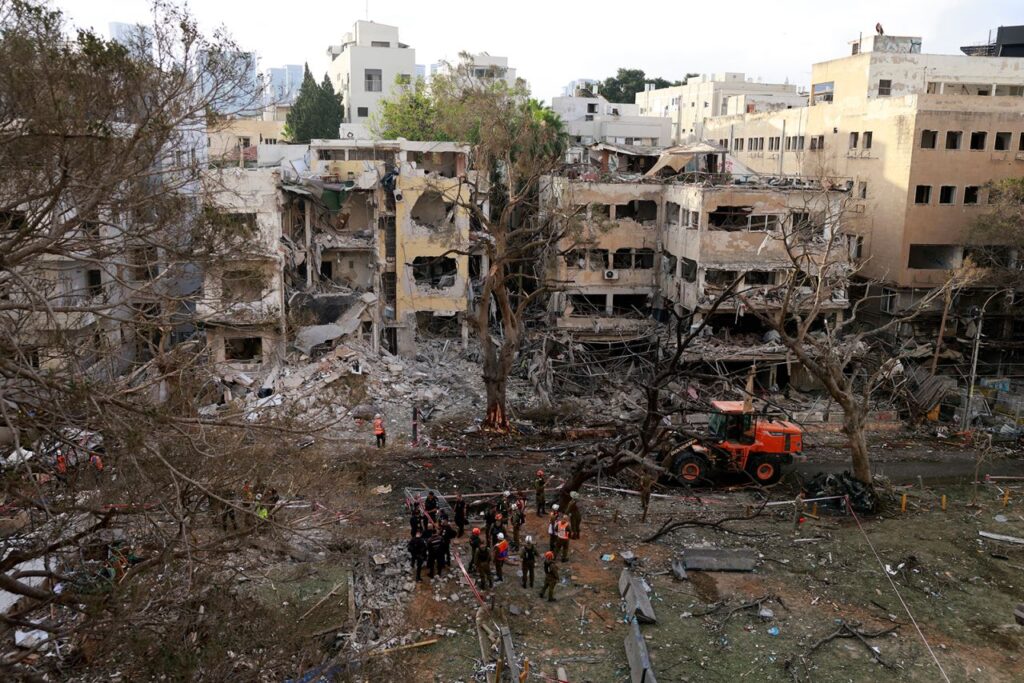
The escalating conflict between Israel and Iran entered its fourth day Monday, with both nations broadening the scope of their military offensives. Explosions rocked cities in both countries overnight, as civilian casualties surged, military targets were pounded, and fears of regional destabilization deepened.
Rising Toll and Expanding Attacks
Iranian missile and drone attacks continued overnight, killing at least eight people across multiple Israeli cities including Haifa, Bnei Brak, and Petah Tikva. Videos from Haifa showed fire and explosions around an oil refinery, damaging critical infrastructure and residential buildings. Israel’s power grid also sustained damage.
Since Friday, at least 24 people in Israel have been killed and 592 injured, including 10 in critical condition, according to the Israeli Prime Minister’s Office. Meanwhile, Iran has suffered at least 224 deaths and over 1,200 injuries, as reported by Iran’s Health Ministry and state media.

Rescuers stand amid the debris of damaged building in Tel Aviv following an Iranian missile attack on Monday. Menahem Kahana/AFP/Getty Images
The Israel Defense Forces (IDF) claimed it has destroyed more than 120 Iranian missile launchers, a third of Iran’s total arsenal, and intercepted over 20 surface-to-surface missiles minutes before launch. The IDF also reported strikes on Quds Force command centers in central Tehran and Isfahan, using over 50 fighter jets.
Civilian Panic and Infrastructure Impact
In both nations, fear has gripped civilians. Tehran residents have begun fleeing the capital, creating long lines at fuel stations amid growing panic. In Israel, scenes of destruction in Tel Aviv showed debris-strewn streets, collapsed buildings, and shattered glass. Survivors recounted hiding in bomb shelters during the attacks.
Yet the safety infrastructure is not uniformly distributed. In Tamra, a Palestinian town in northern Israel, four family members were killed when a missile struck their home. The town’s mayor revealed that only 40% of residents have access to shelters, exposing a longstanding inequality between Jewish and Arab communities in Israel.
The US Embassy branch in Tel Aviv sustained minor damage from the shockwaves of an Iranian missile strike. Ambassador Mike Huckabee confirmed no injuries were reported, though the embassy remained closed Monday due to ongoing “shelter in place” orders.
Political Fallout and Assassination Controversy
Tensions further escalated following a CNN report that President Donald Trump rejected an Israeli proposal to assassinate Iran’s Supreme Leader Ayatollah Ali Khamenei. Israeli Prime Minister Benjamin Netanyahu denied the existence of such a plan. Trump, speaking to reporters, acknowledged U.S. involvement is a possibility but also said he hopes for a diplomatic resolution.
Trump said there was a “good chance” of reaching a deal, but added, “sometimes they have to fight it out.”
Strategic and Nuclear Implications
Israeli strikes have reportedly targeted several Iranian nuclear facilities, including the Natanz and Fordow enrichment plants. However, a recent study by the Royal United Services Institute cautioned that Iran’s deeply buried nuclear sites would be difficult to destroy, even with American bunker-busting ordnance.
The report emphasized that an attack on such hardened facilities would require massive firepower, specialized weaponry, and deep U.S. cooperation, making it a “last resort” scenario due to potential global ramifications.
International Alarm and Regional Ripples
Oil prices surged again Monday, adding to a 7% spike last week, amid fears that the conflict could disrupt global energy supplies. Meanwhile, international leaders have urged restraint, fearing the confrontation could spiral into a broader regional war.
Israel’s Defense Minister, Israel Katz, issued a stark warning: “The residents of Tehran will pay the price, and soon.” Iranian President Masoud Pezeshkian, in contrast, called for national unity and defended Iran’s right to pursue nuclear energy, claiming, “We are not the aggressors.”
Looking Ahead
Israeli and American officials have indicated that Operation Rising Lion, Israel’s campaign against Iran, is expected to last “weeks, not days.” Analysts warn that Iran has proven unexpectedly resilient, regrouping and maintaining offensive capability despite the early loss of key military leaders, including the head of the Revolutionary Guard.
As missiles continue to rain down and civilians bear the brunt of the conflict, both nations appear locked in a dangerous trajectory. Global calls for de-escalation grow louder, but for now, the drums of war beat on in the Middle East.
Written By Rodney Mbua


















